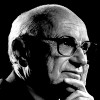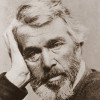“ Man first puts himself in relation with Nature and her Powers, wonders and worships over those; not till a later epoch does he discern that all Power is Moral, that the grand point is the distinction for him of Good and Evil, of Thou shalt and Thou shalt not. ”
Thomas Carlyle, On Heroes, Hero-Worship, and The Heroic in History (1841). copy citation
| Author | Thomas Carlyle |
|---|---|
| Source | On Heroes, Hero-Worship, and The Heroic in History |
| Topic | evil distinction |
| Date | 1841 |
| Language | English |
| Reference | |
| Note | |
| Weblink | http://www.gutenberg.org/files/1091/1091-h/1091-h.htm |
Context
“recognition of Man, and his Moral Duty, though this too is not wanting, comes to be the chief element only in purer forms of religion. Here, indeed, is a great distinction and epoch in Human Beliefs; a great landmark in the religious development of Mankind. Man first puts himself in relation with Nature and her Powers, wonders and worships over those; not till a later epoch does he discern that all Power is Moral, that the grand point is the distinction for him of Good and Evil, of Thou shalt and Thou shalt not.
With regard to all these fabulous delineations in the Edda, I will remark, moreover, as indeed was already hinted, that most probably they must have been of much newer date; most probably, even from the first, were comparatively idle for the old Norsemen, and as it were a kind of Poetic sport.”
source


